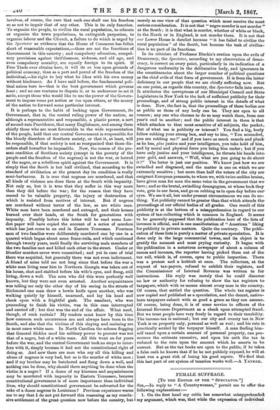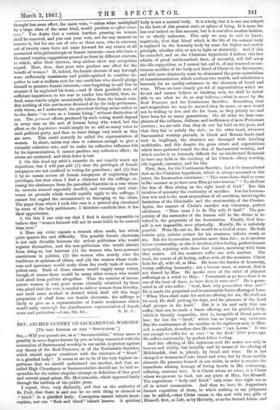FEM ATE SUFFRAGE.
[To THE EDITOR OF THE " SPECTATOR.") SIR,—In reply to " A Countrywoman," permit me to offer- the following explanations :-
- 1. On the first head my critic has somewhat misapprehended my argument, which was, that while the expression of individual
thought has some effect, the mere vote, " unless when multiplied by a large class of the same kind, would produce no effect what- ever." You desire that a certain burthen pressing on women shall be removed, and you cast your vote, not for any measure to remove it, but for one out of two or three men, who in nineteen out of twenty cases have not come forward for any reason at all connected with philanthropic or female interests—men who have a thousand varying suggestions pressed on them by different electors, to which, after their election, they seldom show any scrupulous regard. How, then, does your vote produce any effect for the benefit of women? If, indeed, the female electors of any borough were sufficiently unanimous and public-spirited to combine to- gether to cast a uniform vote for one candidate who should pledge himself to promote female interests,—not forgetting to call him to account if he neglected his trust,—and if their goodwill were of sufficient importance to his seat to render him faithful, then, in- deed, some results might occasionally follow from the female vote. But nothing of this sort is even dreamed of by the lady petitioners, with whom, as I understand, the prevalent feeling seems rather to be the desire " to vote as a human being," without distinction of sex. The personal efforts produced by such voting would depend in every case on the sort of human being who voted, but the effect on the Legislature would simply be to add so many votes to each political party, and thus to leave things very much as they are now. This could scarcely be called the representation of women. In short, unless any class is coherent enough to give a virtually collective vote, and to make its collective influence felt by its representatives, it cannot produce any collective effect ; its atoms are scattered, and their-force is lost.
2. On this head my critic's remarks do not exactly touch my objections, but I will just add (1) that the privileges of female ratepayers are not confined to voting for guardians ; and (2) that I by no means accuse all female ratepayers of neglecting their privileges, but that when I find a claimant for the suffrage ex- cusing the abstinence from the parochial franchise in a case where its exercise seemed especially needful, and excusing such absti- nence on grounds which would equally apply to the suffrage, I cannot but regard the inconsistency as damaging to the claim. The paper from which I took. this case is a printed slip circulated by some of the lady petitioners ; I therefore conclude that it has their approbation.
3. On this I can only say that I find it simply impossible to believe that "women farmers will not be more liable to be coerced than men."
4. Here my critic repeats a remark often made,' but which quite ignores the real difficulty. The possible female electorate is not only divisible between the ardent politicians who would register themselves, and the non-politicians who would abstain from doing so, but between (1) the women who have personal convictions in politics, (2) the women who merely echo the traditions or opinions of others, and (3) the women whose weak- ness and ignorance would make them the ready tools of unscru- pulous men. Each of those classes would supply many voters, though of course there would be many other women who would hold aloof from politics altogether. That the number of incom- petent women is very great seems virtually admitted by those who plead that the vote is needed to deliver women from frivolity, and until some method is devised which shall sift this large proportion of chaff from our female electorate, the suffrage is likely to give us a representation of female weaknesses which would sadly outweigh the simultaneous representation of female sense and patriotism.—I am, Sir, &c., S. D. C.































 Previous page
Previous page